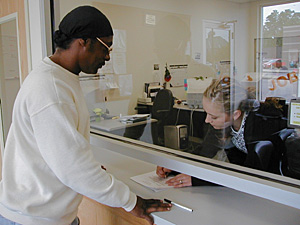|
Audio
Photos
Resources
Your Voice
|
Taking the "temp" of the economy
June 16, 2003
Temporary work may not rank high in prestige, but economists keep a close eye on temps for signs that the economy is recovering. When companies expect to grow, they often hire temporary workers before adding to their full-time staff. This month federal labor officials were heartened by a jump in temporary employment on the national level. In Minnesota the temp market may also be starting a mild recovery. But some wonder whether more temporary jobs are such a good sign after all.
St. Paul, Minn. — It's 8 a.m., and about a dozen men are standing on the sidewalk outside a St. Paul LaborReady office. Rob, who wouldn't give his last name, is dressed neatly in outdoor work clothes. He's been waiting here three hours, but today the waiting paid off. The men are actually heading out to a job, unloading trucks in Apple Valley. There's not always work to be had.
"If they don't have anything, you're sitting around, and it's too late to go do anything else," Rob says. "You're scared because you don't want to leave until you're absolutely sure. Sometimes it's like 10 o'clock, 11 o'clock, so your whole day is shot."
|
You don't want to leave until you're absolutely sure. Sometimes it's like 10 o'clock, 11 o'clock, so your whole day is shot.
- "Rob," day laborer in St. Paul |
The men here say they get work about three days out of seven. And they do come here all seven. These day-laborers are on the bottom rung of the temporary staffing sector, which includes everything from landscaping to clerical work to a few high-skilled jobs like electrical engineering.
Steve Hine, acting research director at the Minnesota Department of Economic Security, says economists watch the temp sector for clues to the economy's direction.
"Many businesses may need to ramp up production at the onset of an economic expansion," Hine says. "But until they're certain about the long-term prospects, they might do so with temporary help."
The federal Department of Labor optimistically noted a jump in May when the national economy created 58,000 new temporary help jobs, the largest increase in three and a half years. In Minnesota, Hine says employment at temp agencies began a slow recovery in March and April after plunging 30 percent in the past three years.
This is traditionally the beginning of the strong season for temp work, which peaks in early fall. Jesse, another man outside LaborReady who's been a temp worker for years, says warm weather helps.
"When it warms up a lot of jobs pop open," he says. "That's probably the best time to try to get your foothold in somewhere to get a permanent job."
Sometimes a job will come along for a week or a month. The longer the better. Workers hope for an arrangement called "temp-for-hire," where successful temping can lead to a full-time job.
|
Companies are just very uncertain about the future of the economy. They don't want to add to their permanent headcount.
- Tim Doherty, CEO of Doherty Employment Group |
But if workers say temp-for-hire is awfully hard to find these days, Tim Doherty says they're right. He's the CEO of Doherty Staffing, an Edina-based chain of temp agencies.
"Companies are using temporaries right now, but very few are being converted to full-time," Doherty says. "Companies are just very uncertain about the future of the economy. They don't want to have to add to their permanent headcount for fear of having to lay them off if the economy turns the other direction."
Full-time work is hard to find. Nationally, the number of people who say they're forced to work part-time or temporary jobs -- because they can't find full-time, permanent positions -- is the highest in nine years.
Kris Jacobs advocates for Minnesota's working poor as executive director of the JOBS NOW Coalition. She doesn't see the growth in temp and part-time work as a phase on the way to better economic times. Instead, she sees a worrying long-term development.
"Temporary jobs are the wave of the future, and employers are trying to keep costs low and keep their profit margins where they want them to be," Jacobs says.
David Reiter, a researcher for the Minnesota Employers' Association, disputes that notion. He says companies are just using temporary help as a tool to meet production needs at the moment. When they're confident business is really on the rise, they'll create full-time jobs again. But for now, Reiter says, many are still looking at an economic climate that seems highly uncertain.
|
News Headlines
|
Related Subjects
|

